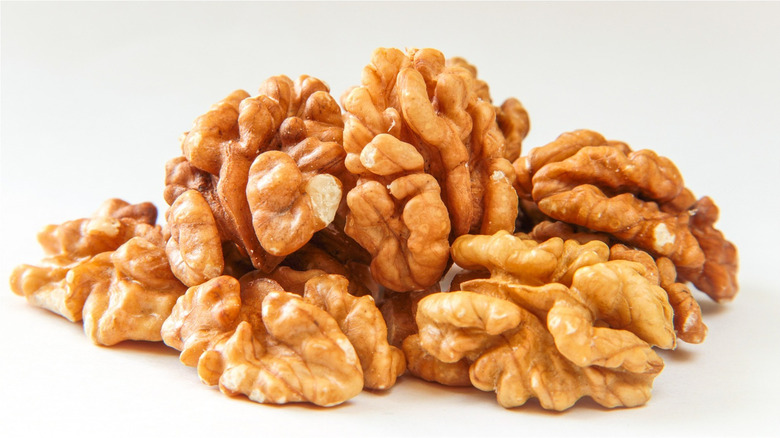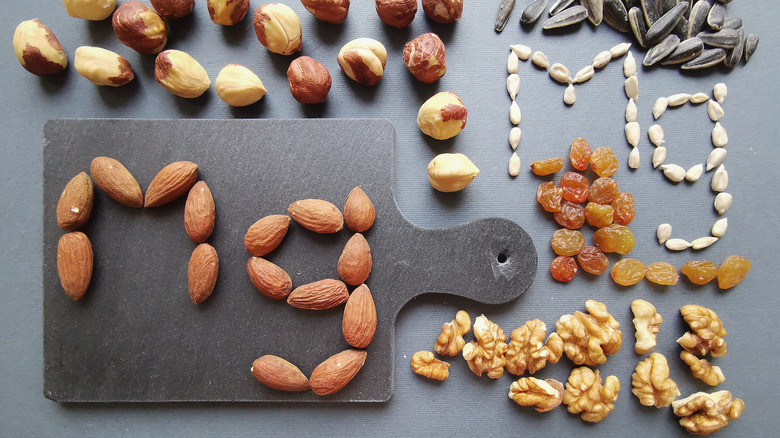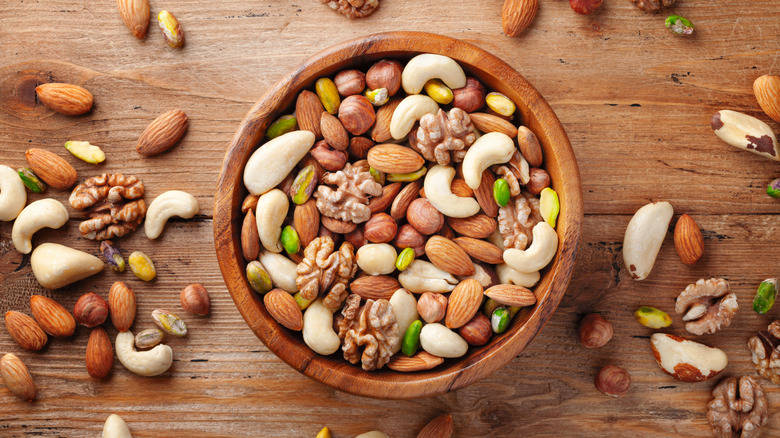Why Walnuts Are A Good Snack To Eat Before Bed
It's no secret that getting sufficient sleep is essential to maintaining good health. Sleeping is how the body recovers and repairs itself, so a lack of quality shut-eye can increase the risk of developing many health problems, including high blood pressure, heart disease, and depression, according to Medical News Today. However, all too often, people struggle with inadequate or poor quality sleep, leaving them tired, fatigued, and unable to perform at their best. While there are a lot of reasons behind this, diet actually plays a starring role in the quality of our sleep.
It turns out that eating the right foods before bed can actually help us fall asleep easier, stay asleep longer, and wake up feeling more energized and refreshed. Meghan Dillon, a registered dietitian nutritionist and HelloFresh nutrition associate, recently explained to Mashed why walnuts are a particularly good food to snack on before hitting the hay. Walnuts' long list of nutrients can help encourage a good night's rest while satisfying a craving for crunchiness.
Walnuts contain lots of sleep-promoting magnesium
Walnuts contain a high amount of magnesium, a nutrient that has been shown to be beneficial for sleep. Dillon explained to Mashed that eating foods high in magnesium can help activate the parasympathetic nervous system, which Simply Psychology reports is also known as the "rest and digest" system. This system helps the body enter a relaxed state, slowing down our breathing, decreasing our heart rate, prompting digestion, and lowering activity in the eyes, blood vessels, and other areas. If the parasympathetic nervous system is not activated, "we may feel stressed and tense, causing us to experience difficulty falling asleep as our body fails to relax properly," Dillon said.
Magnesium also helps send the brain signals that calm down the nervous system, according to Healthline. Additionally, magnesium may aid in the production of melatonin, the hormone that controls the body's sleep-wake cycle. According to Dillon, "Magnesium deficiency is associated with low serum melatonin, whereas sufficient serum magnesium is associated with adequate serum melatonin." Therefore, she recommends eating walnuts, as well as other magnesium-rich foods, like pumpkin seeds, peanuts, and cashews, to help promote healthy sleep.
Walnuts are a good source of omega-3 fatty acids
Dillon elaborated that walnuts are also a good choice for sleep because they contain high amounts of omega-3 fatty acids. These healthy fats have not only been shown to improve heart health and protect against certain cancers, but also to aid the body in sleeping better and longer (via The Sleep Doctor). This is because omega-3s have anti-inflammatory properties and can help decrease levels of a stress hormone called norepinephrine, which disrupts REM sleep. "The standard American diet contains a greater prevalence of pro-inflammatory foods," Dillon said, adding that consuming foods rich in omega-3s can "balance the inflammation in our body, which may in turn improve our sleep quality."
Omega-3 fatty acids, along with magnesium, can also help stimulate melatonin production, meaning walnuts pack a double-punch when it comes to this important sleep hormone. "One study found that low levels of the omega-3 fatty acid, DHA, are linked with lower levels of melatonin. Increasing the consumption of omega-3 fatty acids in those with low serum DHA may increase melatonin production, which is essential for restful sleep," Dillon explained to Mashed.
Some foods can disrupt sleep quality
Though walnuts are a great snack choice for those looking to improve their sleep, other nutritious foods can have the opposite effect. Dillon warns against pre-bedtime consumption of snacks that contain tyramine, an amino acid that is commonly found in pickled and fermented foods like sauerkraut. Although these items are full of beneficial probiotics, which aid in digestion, they also stimulate the sympathetic nervous system. While the parasympathetic nervous system is responsible for slowing the body down, the sympathetic nervous system revs up the body's rapid involuntary response, or "fight or flight," per Live Science. This speeds up the heart rate and makes the body feel alert and awake — not exactly a good recipe for drifting off to a restful sleep.
Of course, many of us already know that any food or beverages that contain caffeine can keep us awake at night. Dillon said that though caffeinated teas have helpful antioxidants, their caffeine content may cause us to "spend an extended amount of time in the 'REM cycle' stage of sleep, too much of which can make us feel groggy the next day." If you're peckish before bed, put down the kombucha and caffeinated tea in favor of walnuts.



